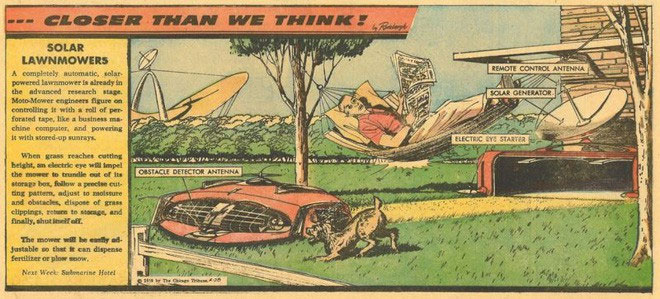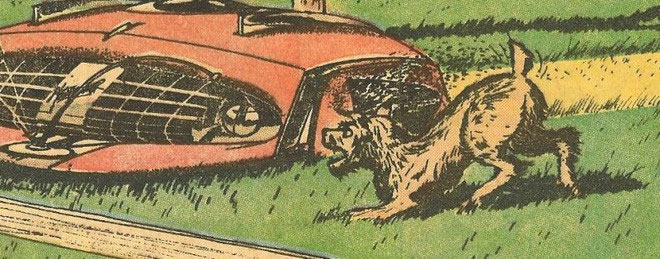In 1959, the solar lawn mower was the future that Americans feared
Specifically, the publication was released on June 28, 1959, from comics Closer Than We Think of Arrthur Radebaugh, who said that the solar powered automatic lawn mower is about to come true. The biggest barrier is, how does it "see" objects and not rushing to pets or children.
Today, mowing robots are quite popular, even when their markets are very limited. However, this type of machinery has appeared many years ago.
We have been promised that there will be a kind of automatic lawn mower, solar powered. That was demonstrated in a hand-drawn illustration in a comic magazine in 1959. It predicted the emergence of these machines but the problem was, Americans were afraid of auto-attaching machines. full of sharp knives hovering over their lawn.
It uses the popular "electric eye" term in the 50s, referring to electronic sensors. In fact, the term electronic eye was used since 1924, describing sensors mounted on remote control aircraft.

The Americans were frightened of the automatic machinery filled with sharp knives hovering over their lawn.
Solar lawn mowers are described as follows:
"Solar powered automatic lawn mowers are fully ready for a more advanced research phase. Engineers at Moto-Mower are trying to control it with a punched tape, similar to a machine. calculated by businesses, power it from stored solar energy.
When the grass reaches the height needed to be trimmed, the electric eye will signal the lawn mower to pull itself out of the container, cut according to the exact pattern given, remove the entangled grass and return to the original place and turn off the power.
It can be easily adjusted for fertilizer or snow scratching. "

It sounded very positive, but this fictional machine in that period had to be perfected and adopted by the US military.
Obviously, the military doesn't care about cutting grass. They are interested in handling other organic materials, such as . bodies. This idea is similar to EART, the type of autonomous machine that was expected to handle corpses in war. And fortunately, they are only on the drawing, not the reality.
- Thai students make solar lawn mowers
- Get close-up when the lawn mower operates under ultra-slow rotation speeds up to 50,000fps
- How did I become a creator of toys?
- Young farmer and machine '2 in 1'
- How do Americans cope with drought?
- 11 incredible 'inventions' come from the past
- Future vision of the solar system
- Economic recovery helps Americans improve health
- Solar cells produced by printing methods are about to come true
- Do Americans come to the real Moon?
- Future solar batteries will be placed in the universe
- New trend: Solar power floats on water
 'Fine laughs' - Scary and painful torture in ancient times
'Fine laughs' - Scary and painful torture in ancient times The sequence of numbers 142857 of the Egyptian pyramids is known as the strangest number in the world - Why?
The sequence of numbers 142857 of the Egyptian pyramids is known as the strangest number in the world - Why? History of the iron
History of the iron What is alum?
What is alum?